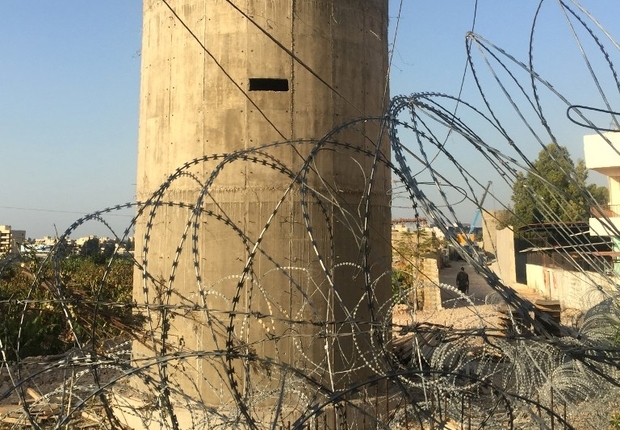Lebanon: Schools in Palestinian camp reopen after gun battles
Beirut, Lebanon - Schools and social services have resumed in Lebanon’s largest Palestinian refugee camp, amid sporadic violence which has interrupted lessons and raised questions about local forces’ ability to keep the peace.
It is the first time in four months that shootings have prompted UNRWA, the UN agency that provides aid for Palestinian refugees, to halt operations at Ain al-Hilweh on the outskirts of the southern Lebanese city of Saida.
The community is already tense because of Lebanese army plans to build a wall round it on security grounds.
On Monday gunman entered a school, which provides primary and intermediate-level education, and ordered terrified pupils and teachers to leave to the sound of live fire.
'UNRWA calls on all those involved to respect the rule of law, the sanctity of human life and the protection of Palestine refugees, especially children'
- UNRWA source
The organisation’s eight schools in the camp remained closed throughout the rest of the day in the wake of a dispute at the Bustan al-Quds district, according to local sources.
That same day, two men were left severely wounded as gunmen fired in front of the headquarters of the Joint Palestinian Security Forces, responsible for safety in the camp.
There were further clashes throughout Tuesday night into Wednesday, as gunfire rang through the camp in a dispute between members of Fatah and Islamist factions operating within the camp, including individuals loyal to the Salafi leader Bilal Badr.
A similar round of gun battles left three men dead and nine others wounded in April, while Fatah members exchanged fire with other factions following a strike in the camp in September.
A spokesperson from UNRWA told MEE: “An armed person went inside the school and asked them [ students and staff] to leave,” said the source. “The teachers reacted by dismissing the students and they all left.”
MORE: Why Palestinian camp is protesting 'wall of shame'
The spokeperson said that while no pupils were injured, the incident put them, “at considerable risk” and that repeated armed violence had increased risks to civilian lives.
“UNRWA calls on all those involved to respect the rule of law, the sanctity of human life and the protection of Palestine refugees, especially children,” the agency said.
A Fatah source told MEE that it suspected rival groups were trying to provoke a dispute with the movement.
“Around midnight [on Tuesday] two Islamist youths crossed towards an office belonging to Fatah, and they were shot at,” the source said. “After a few minutes gunfire also started from another Fatah point towards the Teebah district, which belongs to the Islamists.”
Local news site Capital of the Diaspora showed bullet damage to cars and buildings around the camp’s Fawqani Street and market, and what appeared to be an unexploded grenade. Sources inside the camp reported injuries but no fatalities, and a ceasefire after early morning negotiations between camp factions.
“We are not scared. We are used to this. There is fear for the children, for their safety. But basically we hear the sound of gunfire every day'
- Mohammed, camp resident
Local media said that the latest gunfire raised questions about security within the camp. It comes after severe objections to a concrete security wall that the Lebanese Army began building around Ain al-Hilweh last month.
Authorities claimed the barrier would help prevent movement of “terrorists”, but residents branded it a “wall of shame” and protested.
Commander of the Palestinian national security force Major General Subhi Abu Arab told Lebanese newspaper Al Mustaqbal that the latest clashes may have been “fabricated to upset the plans” for alternative security measures, although these would be secret until after discussions withLebanese intelligence services.
Ain al-Hilweh has developed a reputation as a hide-out for fighters wanted for plotting attacks in Lebanon. In September a special forces operation led to the arrest of Imad Yassine, an Isis “emir” in the camp, while a Fatah official was assassinated within its perimeter last summer.
Lebanon’s army does not enter the country’s 12 Palestinian refugee camps, with security duties carried out by joint forces of the factions that operate within.
MORE: Lebanon's very own apartheid wall
Gunfire is common in the camp. Armed men patrol the streets and signs warn residents not to bring Kalashnikovs into health clinics in the camp. Ain al-Hilweh’s residents have grown sadly resigned to the sound of bullets.
One resident, who goes by the name of Mohammed, told MEE: “We are not scared. We are used to this. There is fear for the children, for their safety. But basically we hear the sound of gunfire every day.
“We are not scared,” he said. “We regret that this is just how the situation is.”
More than 58,000 Palestinians and 4,000 Syrians live in thecamp, which was set up in 1948 by the International Community of the Red Cross for people fleeing northern Palestine.
New MEE newsletter: Jerusalem Dispatch
Sign up to get the latest insights and analysis on Israel-Palestine, alongside Turkey Unpacked and other MEE newsletters
Middle East Eye delivers independent and unrivalled coverage and analysis of the Middle East, North Africa and beyond. To learn more about republishing this content and the associated fees, please fill out this form. More about MEE can be found here.


